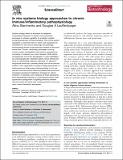In vivo systems biology approaches to chronic immune/inflammatory pathophysiology
Author(s)
Starchenko, Alina; Lauffenburger, Douglas A
Download1-s2.0-S0958166917302161-main.pdf (1.427Mb)
PUBLISHER_CC
Publisher with Creative Commons License
Creative Commons Attribution
Terms of use
Metadata
Show full item recordAbstract
The Authors Systems biology offers an emphasis on integrative computational analysis of complex multi-component processes to enhance capability for predictive insights concerning operation of those processes. The immune system represents a prominent arena in which such processes are manifested for vital roles in physiology and pathology, encompassing dozens of cell types and hundreds of reciprocal interactions. Chronic, debilitating pathologies involving immune system dysregulation have become recognized as increasing in incidence over recent decades. While clinical consequences of immune dysregulation in such pathologies are well characterized, treatment options remain limited and focus on ameliorating symptoms. Because it is difficult to recapitulate more than a severely limited facet of the immune system in vitro, application of systems biology approaches to autoimmune and inflammatory pathophysiology in vivo has opened a new door toward discerning disease sub-groups and developing associated stratification strategies for patient treatment. In particular, early instances of these approaches have demonstrated advances in uncovering previously under-appreciated dysregulation of signaling networks between immune system and tissue cells, raising promise for improving upon current therapeutic approaches.
Date issued
2018-02Department
Massachusetts Institute of Technology. Department of Biological EngineeringJournal
Current Opinion in Biotechnology
Publisher
Elsevier
Citation
Starchenko, Alina and Douglas A Lauffenburger. “In Vivo Systems Biology Approaches to Chronic Immune/inflammatory Pathophysiology.” Current Opinion in Biotechnology 52 (August 2018): 9–16 © 2018 The Authors
Version: Final published version
ISSN
0958-1669